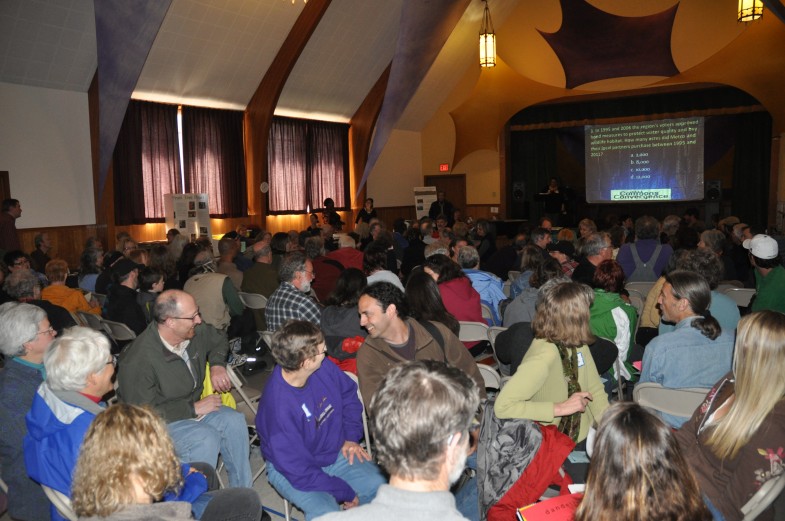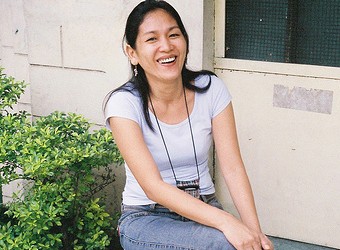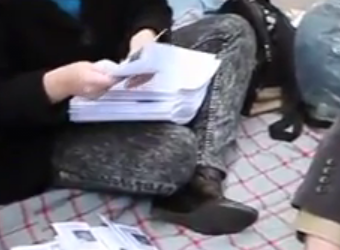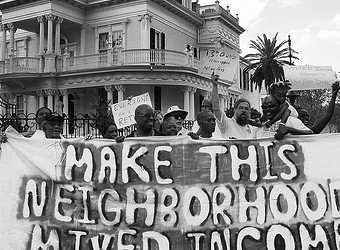Despite sunny skies in what has been an unusually gray Portland spring, more than 200 people spent a Saturday afternoon indoors to celebrate all they share at the Oregon Commons Convergence May 7.
The rousing event was organized by the Oregon Commons and host committee of 18 groups working under the banner “Because We’re All in This Together“with help from On the Commons. Nearly 30 groups (see sidebar) took partThe event was sponsored by OTC and Metro, Portland’s elected regional government that offers a model of how the public sector can operate out of a commons framework.
The parish hall at St. David of Wales Episcopal church was packed with people engaging in spirited conversation, listening to presentations about the wealth of cooperative action in the region, and browsing tables overflowing with opportunities to become involved in local commons-based groups ranging from The Friends of Family Farmers to Ecumenical Ministries of Oregon. Singer Todd Samusson set the mood with a playful sing-along of his tune about a community barn-raising “Raise Up the Rafters.”
Three new videos debuted at the convergence in which Portlanders share their experiences of living the commons and their search for ways to expand and strengthen what belongs to everyone.
“The Currency of Democracy”:http://www.youtube.com/watch?v=u5XIyW8onbA
“It Takes a Village to Make a Place”:http://www.youtube.com/watch?v=VuO3f2aEprY
“All Our Relations”:http://www.youtube.com/watch?v=o_4VnMLFS0w
And a fourth video coming out of the event is now circulating:
“Reclaiming Our Water Commons”:http://www.youtube.com/watch?v=Y2VAxsyBTf8
Mark Lakeman, co-founder of City Repair, a do-it-yourself campaign to expand public spaces in the city, listed many of the accolades bestowed upon the Portland region for its achievements toward urban sustainability and livability, noting that the region’s high level of citizen involvement accounts for all these honors. Lakeman is one of the commons champions profiled in the new OTC book “All That We Share: A Field Guide to the Commons”:http://www.onthecommons.org/all-that-we-share.
The convergence included an entertaining Test Your Commons Knowledge Quiz where the audience scrambled to select multiple choice answers to questions like: Q: What Percentage of people living in the Portland metro area live within ¼ mile of public parkland? A: 52 percent.
Julie Ristau and Jay Walljasper of On the Commons then discussed the hopeful potential of the commons to illuminate a new sense of possibilities for the world, even in a period like now when cynicism and despair appear justified.
Walljasper, author and editor of All That We Share, emphasized that in his travels promoting the book he’s seen how ordinary Americans are increasingly fed up with these developments:
*Commodification, where everything valuable, from health care to water, now brandishes a price tag;
*Privatization, where things essential to us all, from information to public gathering places, becomes someone’s private property;
*The Stripping of Public Assets, where things we all depend upon, from transit to police protection, suffer deep budget cuts and service reductions;
While the Tea Party may have capitalized on the first burst of panic about the economic crisis, their policies will only heighten the problems about which most Americans are deeply worried. A new upsurge of citizen concern could offer the chance to rediscover both the power and the pleasure of cooperative, collaborative action.
Ristau, co-director of On the Commons, explained that at its essence the commons means flipping the prevailing worldview “from me to we.” That shift would change the world in practical ways:
*Equitable ways of living, instead of the wealth of the commons benefiting only a privileged few.
*Communities decide their future instead of powerful interests.
*Stewarding resources instead of depleting them.
*Taking responsibility for what is ours rather than taking all I can.







